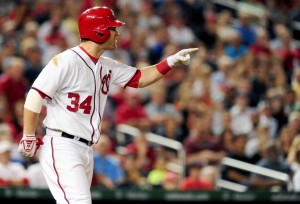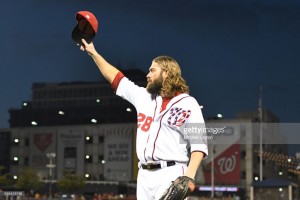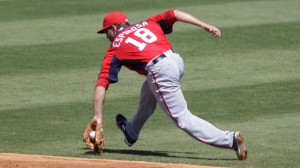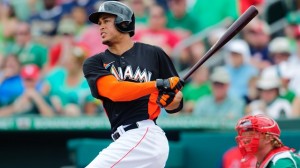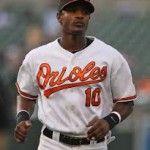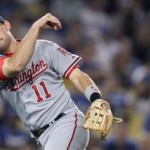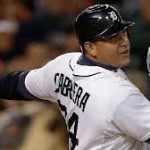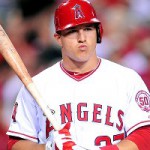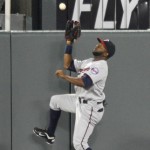
Denard Span's "best of 2012" defensive catch, highlighting more of what we can expect in 2013. Photo NYpost.com
I wasn’t expecting much baseball talk in Ask Boswell this week (12/10/12), not with the Redskins on a 4-game winning streak. But there were some significant baseball moves to discuss, and a ton of baseball questions made their way in. So here we go. As always, I read the question and answer before reading Tom Boswell‘s response, and sometimes edit questions for clarity:
Q: I find it hard to imagine any starter of worth will sign with the Nats now that there are five rotation certainties in place. Will the Nats get the starter depth they desire?
A: There is definitely a class of starter out there who absolutely would take a minor league contract with a team like the Nats in order to rehabilitate their FA value, which may have been eroded due to injury or a bad season. Who would sign Erik Bedard (as an example) to anything guaranteed right now? Or Jonathan Sanchez? I would say though that more likely is the team acquiring guys on the minor league free agent market (where there’s 100s of guys available) and trading for farm system depth (I could envision both Michael Morse and Danny Espinosa being moved for prospect depth right now). Boswell didn’t really address this part of the question, instead focusing on the next question.
Q: Why did Rizzo non-tender Gorzelanny, who as the LHP long man could spot start? He has been effective at times, the non-tender now seems like a false economy.
A: Simple econonmics; despite Tom Gorzelanny‘s salary being miniscule in the grand scheme of things, they couldn’t tender him and risk getting an un-acceptable award in arbitration. I posted on the topic ahead of the non-tender deadline. I’m hopeful that Gorzelanny re-signs with the team at something close to his 2012 salary. But, that being said the bullpen looks awfully full right now and there might not be room for him. 5 returning RH relievers, new signing Zach Duke and only one spot left, likely being filled by Bill Bray in a pure LOOGY move. Boswell points out that Duke exactly replicates what Gorzelanny would have given us at a fraction of the price. Enough said.
Q: How do you like the Denard Span acquisition versus Philly’s acquisition of Ben Revere? Should the Nats have acquired Revere instead of Span? Do the Nats have an internal CF option after Span’s contract ends?
A: I posted my opinion on the Span deal here; quick analysis: liked the Denard Span deal but didn’t like that they made it. Now, if I compare the Span to the Revere deals, I can’t help but say that I think Philadelphia overpaid, badly. Trevor May was Philly’s #1 prospect in their system. May for Revere may have been a decent deal (akin to our own Alex Meyer for Span), but throwing in a servicable starter with 46 decent MLB starts under his belt was questionable. It isn’t like Ben Revere is the second coming of Joe DiMaggio; he had a 89 OPS+ last year in his third pro season. Great defense absolutely, but at what cost at the plate? At least Span profiles as a better-than-league-average hitter. The Span contract is for 2 years, by which time the Nats have a slew of potential replacements (in likely order Goodwin, Perez, Hood, Taylor), so yes there’s plenty of rising talent in the system at center. Boswell doubts the talent of Trevor May despite the consensus scouting opinion of the player, but he likes Worley and thinks the Phillies “took a flier on talent.” He does think Span > Revere though.
Q: Have the Nats done enough to their roster to win it all? Do they need another closer?
A: I believe the team has already done enough to re-qualify for the 2013 playoffs, especially in the NL East where Miami and the Mets are reeling, barring a slate of pitching injuries. I can make a legitimate argument (tease for a future post) that the WAR improvements expected from our existing players (Strasburg, Harper, a full season of Werth, etc), plus addition by subtraction for players who hurt us last year (Nady, DeRosa, Henry Rodriguez, etc) alone will result in a better team than 2012. Do we need another closer? No, but I think one more right handed option out of the pen could help. That being said, we don’t really have any 25-man room right now given the anticipated pen. I liked last year’s Brad Lidge signing as a way to get some bullpen help, but doubt the team will do it this year. As far as Drew Storen goes, he’s a top notch reliever and does not need to be replaced. But I could see the team flipping him or Tyler Clippard as they get more expensive. Boswell says the Los Angeles acquisitions change the game, and teams like the Nats may have to re-think their approaches.
Q: What do you think of the Shields trade? Who comes out ahead? Do the Rays have enough pitching to remain AL East contenders, even after trading their No 1 starter?
A: I believe Tampa Bay fleeced Kansas City; Shields was NOT their #1 starter (David PriceJeremy Hellickson) or honestly maybe not even their #3 (Matt Moore, at least on potential). So the Rays traded a mid-rotation starter who they wanted to move anyway, along with a long-man in Wade Davis for the best prospect in the minors right now (Wil Myers), the Royal’s #1 pitching prospect (Jake Odorizzi), another high-end pitching prospect (Mike Montgomery, a former highly regarded arm), and yet another minor league player. That is just frankly ridiculous. If you had told me the trade was simply Myers for both Shields and Davis, I could have squinted and understood. But the addition of the other prospects made this a complete heist for Tampa. You don’t trade the best prospect in the minor leagues for anything less than an ACE starter. Does Tampa have enough to remain AL east contenders? Absolutely yes; this was a trade of spare parts for Tampa (akin to the Nats trading Tyler Moore and Steve Lombardozzi for some other team’s two best prospects) and they didn’t give up anything that they weren’t already planning on replacing. Dayton Moore has gone all in on this move; if the Royals do not win the division in 2013, he’s out of a job. Boswell didn’t really offer an opinion, just saying that the Rays are still stocked and noting that the price in prospects was why the Nats stayed away. Disappointed not to read an opinion on the trade.
Q: Will Harper be hitting cleanup this year and, if so, what’s your thinking on this?
A: Answer: It depends. If the team does NOT re-sign Adam LaRoche, then they have precious little left-handed hitting in the lineup, and Harper will be forced to bat somewhere in the middle of the order. Cleanup may have to be the spot. If LaRoche does come back, then the team can spread out its lefty power and continue with a similar lineup to what they used last year (going Harper-Zimmerman-LaRoche-Werth for L-R-L-R). I certainly don’t think that someone like Harper will have any issues batting clean-up in the major leagues; one thing he’s never been accused of lacking is pride. Boswell agrees with the opinion here, and then talks about just how much respect Harper earned in his rookie season.
Q: Should I be worried about our pitching depth? Our pitching was remarkably healthy this year and if that doesn’t hold true, especially with questions about Haren’s health I am not sure we can assume that will hold true this season. Don’t we need another starter or two who could eat innings if needed?
A: Yes, we have a depth issue. Especially given that we’ve traded nearly an entire AAA team worth of rotation insurance in the last two off-seasons (Milone, Peacock, Meyer, Rosenbaum all traded away or lost to rule 5 in the last two off-seasons). But Dan Haren has been remarkably durable through his career, only missing 28 games in his entire career to injury. So lets temper the whole “Haren is fragile narrative.” He’s not; he just happened to have an injury in 2012. I’m assuming, until proven otherwise, that Haren will return to his previous form and throw 220 innings. Does this mean that we weren’t lucky in 2012 and should plan for someone to get hurt in the rotation? Absolutely. I believe this is why moving either Michael Morse or Danny Espinosa for starter depth is wise. Boswell reminds the reader about Duke’s starting capability and the team’s plans for Christian Garcia. There’s also Ryan Perry. And there’s also the slew of guys who won’t get MLB jobs but who aren’t ready to hang them up who will be there for the taking. You know, guys exactly like Duke was last year 2 days before the start of the season.
Q: Don’t you think that if LaRoche was going to re-sign that he would have by now? If he goes, have the Nat’s alienated Morse?
A: No; the baseball off-season moves slowly, and few moves happen before the Winter Meetings anyway. LaRoche is right on schedule for his negotiations. Now, the team’s overt coveting of LaRoche has to have Morse pissed. I would be; clearly the team is planning for your exit on a day to day basis in the open press. Which is a real shame, because I like Morse and don’t think he did anything to warrant being treated this way. Boswell somehow thinks that this whole dance is a compliment to Morse. I don’t get it.
Q: Rizzo has a 2 year offer on the table for LaRoche, and history says he’s not likely to budge. Moreover, with other options like Morse and Moore, there’s no reason for him to. If another team needed help at 1B and was willing to give LaRoche 3 years, wouldn’t they have done so already? You’ve said all along you see the Nats and LaRoche amicably parting ways. Still see it that way?
A: Rizzo can budge on his demands. Hey; at least it isn’t a four year deal that LaRoche is demanding. I think a 2year deal with a club option for a 3rd makes a lot of sense for the team. For the player, not so much. This is LaRoche’s last chance at the free agent bonanza; he has to get the biggest contract he can. The market for LaRoche won’t completely clear until Josh Hamilton signs. While they’re not apples-to-apples comparisons, they are both lefty power hitters. If a team that wanted Hamilton doesn’t get him, they can come looking for LaRoche to fit a middle of the order lefty bat. The team still needs and wants LaRoche for two main reasons; plus defense and lefty power. They’ll take a step backwards in both categories by going with Morse at first and Moore as first guy off the bench. At the beginning of the off-season I thought LaRoche was leaving, because he’d want (and get) a 4 year deal. Now I think he may be back. Boswell now thinks LaRoche may be back and the team may give a 3rd year.
Q: I realize that the life with LaRoche is much preferred by the Nats. However, do you think there will be much of drop off in the quality of Nats play? Even without him, I have no doubt that the Nats will still win their share of games and make the playoffs (assuming the starting rotation stays relatively healthy). All starters are strike out pitchers. Offensive production should be about eqaul (though not as balanced),and Morse/Moore will probably make a few more errors. I feel like moving Zimmerman to first in 2014 and have Rendon starting at third would be the ideal way to make sure the core stays in tact.
A: I mostly agree; we’ll live without LaRoche but will be righty-heavy. Morse is healthy and has shown 30 homer capabilities in the past; why wouldn’t he do that again in 2013? It is a contract year for him after all. Meanwhile. the “save first base for Ryan Zimmerman” plan is one I’m 100% for; we’re just waiting for Anthony Rendon to show up. Boswell cautions to temper expectations for Rendon, who hasn’t had an injury-free season in years.
Q: Why does Shane Victorino get a 3 year deal before Adam LaRoche?
A: Because the Red Sox made a rash, poor signing? The LaRoche market just hasn’t played out yet. Plus, filling a first baseman versus a corner outfielder is more risky for teams, so they do more due diligence. Boswell doesn’t like the Victorino deal. At all.
Q: Michael Young had the lowest WAR of ANY position player last year, do you really think he’s an upgrade for the Phillies? Personally, I can’t wait for those fans to start booing him 2 weeks into the season.
A: Yes, Michael Young looked pretty bad statistically last year. But i’m guessing that a change of scenery may help him. Texas has spent the past several seasons acquiring players to overtly replace Young; the year after he won a gold glove at short the team asked him to make way for Elvis Andrus and he moved to third. Then the team moved him off of third when they acquired Adrian Beltre. Then the team moved him to first … but then gave most of the starts at first to Mitch Moreland Maybe his 2012 was just pure disappointment in his treatment by the club where he’d played his entire career. I think though that at his age (36 next year) he’ll be lucky to be just replacement level. Boswell states the obvious; the Phillies are hoping for the 2011 version of Young, not the 2012 version.
